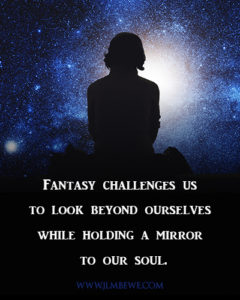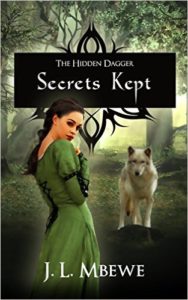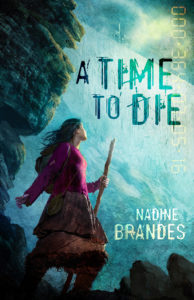Reading Fantasy
 I think everyone should read fantasy.
I think everyone should read fantasy.
Or any derivative of speculative fiction for that matter. Let me explain.
This past year I was contemplating God, life, and writing fantasy. And a thought struck me. Fantasy gives us something that no other genre can give, or at least not as well as fantasy can: Wonder and awe and the greatest portrayals of battle between good and evil. Something that the awesome David Farland reiterated at Realm Makers this past year.
So I decided to sit down and write up why I think everyone should read fantasy.
Motivation.
When I get done reading books like Cast of Stones or watching a kick-butt movie like Avengers, I feel motivated to learn how to fight with a staff or take up sword play. Or, you know, learn astrophysics overnight. Not only do I feel motivated to improve my life, I feel like I CAN do it. Well, maybe not the astrophysics. When the zombie apocalypse comes, I want to be ready for it. The only problem is I like food too much. Ha!
 Inspiration.
Inspiration.
Books like Blaggard’s Moon and movies like Man in the Iron Mask make me want to BE a better person. Samwise makes me want to be a better friend or their fight against such insurmountable odds inspire me to never give up. There are so many! Merlin in Merlin’s Blade. Anna’s sacrifice and love for her sister, Elsa. Tinkerbell standing up for the Neverbeast. The My Little Ponies and the magic of friendship—we can be friends despite our differences. Can you tell I have young kiddos in the house?
The loyalty and honor, the self-sacrifice, the kindness that I all too often fall short of. That’s the kind of life I want to live. Those are the kinds of stories I want to write.
Challenged.
Fantasy can be a reflection of life, the world around us, and our inner journeys. It challenges us to look beyond ourselves while it holds up a mirror to our souls.
It helps us to understand our world better, explore concepts of right and wrong, and the possible consequences of people’s decisions on a world-wide level. We can get so caught up in our bubble and forget how our choices and actions affect others.
Pirates of the Caribbean. I almost hated the third movie. Where was my happy ending??? And then I realized that it was as about as happy as Will or Elisabeth could have had. Then the movies deepened for me as I shared in an older post, What Pirates Taught Me: It’s no longer about the fun and the adventures to be had, but about the consequences of our choices, standing up for what we believe is right, whether or not it is acceptable in other people’s eyes, whether or not it brings us happiness or not, but because it was noble, self-sacrificing, putting others first, etc.
The Mummy & The Mummy Returns. LOVE those movies. What I find amazing in Mummy Returns, is that we see the contrast of committed love (Rick & Evie) and lust. (Imhotep & Anck-Su-Namun) What a great way to demonstrate the principles of God in action!
 A Time to Die challenged me to live life to the fullest. What if I had only one year to live? How would I live?
A Time to Die challenged me to live life to the fullest. What if I had only one year to live? How would I live?
Fantasy is also a reflection of our inner world. Just like Zachary Totah mentioned in his post about Epic Journeys, we can all relate to characters setting off on quests and adventures, because it echoes our own journeys. Journeys of overcoming great obstacles, of healing, of finding hope amid the darkness, and finding our way in this crazy thing called life.
And because fantasy can be a reflection of life, the stories can get dark.
I appreciate the darker stories, because life is dark. You’d think reading darker novels or watching darker movies that we’d be more depressed or something. And perhaps for some that is the case. Only you can answer that. But for me, it can inspire us to overcome our own darkness. Like G.K. Chesterton said: “Fairy tales do not tell children the dragons exist. Children already know that dragons exist. Fairy tales tell children the dragons can be killed.” I think that’s why I love the Tales of Goldstone Wood so much. I can recognize the dragon in me and I know I need the Prince of Farthestshore to help me fight it.
God.
If you are a Christian and you’re reading the Bible, you would know that we serve an amazing, fantastical God. The God who created the world, set the planets spinning, and the stars a burning. The God who set aside His glorious immortality and took on mortal flesh to live among us and redeem us. How crazy amazing is that? And then we have the stories. Balaam and the talking donkey. Angels. The walls of Jericho. The day the sun stood still. Parting the red sea. Healing the sick, giving sight to the blind, raising people from the dead. What other genre can better demonstrate the wonder and power of God? Or make the invisible visible? Or see His principles in action?
There have been many times that God has spoken through a story to me. The above paragraphs point to a few examples. Many times fantasy books and movies have given me greater insight into my journey or God’s Word.
Example. Harry Potter. When I read that Voldemort couldn’t touch Harry because Harry’s mother had sacrificed herself to protect him, I had an aha moment. Satan cannot touch me because of what Christ did on the cross. Sure I’ve read about it in scripture, but it hit me. Now. I’m not trying to Christianize anything here. All I’m saying is that God can use stories to speak to us. But we all knew that already. Jesus did it. A lot.
And Thankful.
Last but not least, when I finish watching an out-of-this-world movie like Stargate, or turn the last page in a book like The Shock of Night, I am THANKFUL. Thankful to be alive here and now. Thankful that we don’t live in a world with aliens trying to eat us. Thankful that we don’t have to deal with zombies or monsters or fire-breathing dragons. Thankful that we have things like the laws of Thermodynamics and gravity and such. I’m thankful that we know how this story will end and Who wrote it.
Some might think fantasy is pure escapism, but in reality, it helps us deal with the darkness in our own lives, inside and out. It can give us the motivation for self-discipline, the inspiration to rise above and become better, and it can challenge us to look at life and ourselves differently. It can help us understand our spiritual journey better and help us to see the light oh so much brighter. And the escaping part isn’t too bad either. I should know. Books were once my drugs.
So what say you? What stories have inspired or challenged you?
– – – – –

Writing as J. L. Mbewe, Jennette is an author, artist, mother, wife, but not always in that order. Born and raised in Minnesota, she now braves the heat of Texas, but pines for the Northern Lights and the lakes of home every autumn. She loves trying to capture the abstract and make it concrete. She is currently living her second childhood with a wonderful husband and two precious children who don’t seem to mind her eclectic collections of rocks, shells, and swords, among other things. Here, between reality and dreams, you will find her busily creating worlds inhabited by all sorts of fantasy creatures and characters, all questing about and discovering true love amid lots of peril. She has two short stories published in The Clockwork Dragon anthology, and four short stories set in the world of Nälu. Her debut novel, Secrets Kept, was nominated for the 2014 Clive Staples Award, and its sequel, Darkened Hope is coming May 2016.
Stay up-to-date with all things Nälu and her journey as a writer mama at JLMbewe.com. Connect with her on Facebook, Twitter, Instagram, and/or Pinterest.









































Oh, Jennette! Yes, yes, YES! I said AMEN all the through your post. I am so thankful more and more people and Christians are seeing the value in fantasy. I’ve loved the speculative genre ever since I can remember, but sometimes didn’t want to tell anyone for fear of judgment. Even today, when people ask what I write, I say, well, inspirational fantasy, in an apologetic tone. I’m working not to do that anymore.
The fantasy story that made a change in my heart was Hinds’ Feet on High Places by Hannah Hurnard (an allegory). Going on the journey with Much Afraid and hearing her say to the Shepherd, “If you can, you may deceive me, but don’t let me leave you.” WOW. Am I brave enough? Do I trust God enough to say that?
The first fantasy epic that caught my attention was, of course, The Hobbit and TLOTR. The first fantasy novel that made me want to write it was The Elfstones of Shannara by Terry Brooks.
Thank you, Jennette! I so needed to read this today.
You’re welcome! I am so glad you enjoyed the post. Hinds’ Feet on High Places is definitely a favorite of mine. A bit mind bending at times, but beautiful. I love allegory. 🙂 Thank you for sharing!
I’m so blessed by this post. I just finished reading Mullin’s Bid the Gods Arise, and couldn’t help but be thankful for the book. The book deals with two cousins who share a brotherly bond but are taken from everything they’ve known and cast into a world they never knew existed. I told the author his book helped me to escape from my emotional turmoil (my grandfather passed away, family issues, etc) and led me right back to the Lord of all, who can handle any situation. It was a fantastic read.
I read Bullard’s Gemworld before publication and that book showed me that God is not only the God of what is but also the God of what could be, which, in my eyes shows His sovereignty.
In Johnson Chadesh Chronicles, Books 1 and 2, I was thrown into a world where God gives us all a second chance. I won’t tell the premise of the story (it’s too controversial) but it shows how our actions affect more than ourselves but the world around us. That we are important in the grand scheme of things.
There’s more I could choose of course, but I totally am on board with what you are saying.
Great post!
Hi Parker! So glad you enjoyed the post! I love Mullin’s Bid the Gods Arise. It makes me happy when I see more and more people discovering it. I love how it helped you through those difficult times. Thank you for sharing!
I love the enthusiasm in your post! It’s catching. 🙂
It’s funny, though, that none of the great things you point out are actually specific to speculative fiction. Perhaps fantasy tends more towards those elements, but there’s nothing intrinsically in the definition of fantasy that makes it particularly inspiring or challenging or insightful about God. Any genre can do those things when written and read in the right way. So what particularly about fantasy makes it suited towards these things?
For me, fantasy can be insightful about God in a way that other genres can’t, because it can highlight how God’s truth can be manifest in many different cultures. Seeing God in the light of a different worldview can be incredibly eye-opening. Even in secular fantasy, it’s neat to look at different peoples and cultures and try to think, “How would they see God and the gospel of Christ? What elements of Christianity would be attractive and resonate with them? What elements would be difficult?” And I love the metaphorical potentials in magic systems. God is much bigger than my 21st-century Western viewpoint, and fantasy can reflect that beautifully.
Thank you sheesania! You make a good point. These things aren’t necessarily limited to speculative fiction. And for sure what I was saying is not in the definition of fantasy. Nor any generic definition of any of the genres. It has more to do with how we process what we read through our worldview, our experiences, and such.
Christy by Catherine Marshall is not fantasy by any means, but it was one of the most influential fiction novels in my life. It turned me, a seeking, hopeless youth to God. So yes, I believe that other genres are capable of illustrating what I’ve listed above. God can use anything to reach us or teach us.
I think fantasy is best suited toward these things because it is not bound to our rules, our world. God operates outside of those things (and within!) Or maybe it’s just how I am wired or the season I’m in.
I think you summed it up best in your last sentence:
“God is much bigger than my 21st Western viewpoint, and fantasy can reflect that beautifully.”
THAT is so true. We read and interpret the Bible within our bubble, but God is the God of universe, not just our bubble. And I think fantasy can help us with that.
Thank you for adding to the discussion!
Maybe this is me reading too much into things, or me kicking a little against “Everyone should do this, read that, watch this movie” types of ideas. Even if something is good, like BBQ, I have a hard time saying “Everyone should eat BBQ!”
Speculative fiction is fine, I read a lot of it, and almost all of my fiction writing has some kind of spec element to it. But other people aren’t into it, and I can’t say that they are wrong or somehow deficient in their tastes. And while some spec fiction stories might be among the best fiction I’ve read, there are also non-spec works in there, too.
Maybe it’s unfair to compare most spec fiction to classic works like “Little Dorrit”, “Cry, The Beloved Country”, or “Les Miserables”, few works of any genre get up to those levels. Maybe another comparison would work better.
Comics and manga are usually not considered high literature, with good reasons. Recently, I’ve been reading a manga series called “A Silent Voice”, about a boy who first torments and bullies a deaf girl then years later tries to make up to her for the bad ways he treated her. There are no spec elements in the story, but I’ve read few stories, Christian or secular, speculative or non, that have more forcefully shown the difficulties of repentance and forgiveness, the difficulties of dealing with someone with a handicap and also the difficulties the handicapped person has in dealing with others, and how people will either go to great lengths to not take responsibility for their actions or let themselves be crushed by guilt.
Fantasy, and spec fiction in general, is fine, like I said before. Guess I just get a bit stubborn when it seems like someone says I have to read it. It seems like the important thing is not so much genre, but good storytelling and good messages, which can happen in almost any genre (not counting the ones that are plainly perverse and obscene in themselves).
Hi Audie Thacker,
Maybe you’re right. Perhaps I shouldn’t have said “should”. No one likes to be told what to do. I get that. The article was meant to be a light-hearted look at the possible benefits of reading fantasy. I understand it isn’t everyone’s thing. Classics and contemporary romance aren’t my thing. We all have our preferences, but I believe we benefit from reading beyond our normal tastes. Writers are encouraged to do so more to aid in developing our craft.
I agree about good storytelling and messages. There is an abundance of novels that do not fall under the umbrella of speculative fiction that contain great messages and storytelling. Still, I feel there is something more to fantasy. Have you read Brent King’s post: Fantasy: An Indispensable way to Understanding Ourselves?http://www.speculativefaith.lorehaven.com/fantasy-an-indispensable-way-to-understand-ourselves/
He concluded with:
“The truth is that we need every tool at our disposal to even weakly grasp a meaningful understanding of ourselves and our world. And metaphor—indeed fantasy—is at the top of that list of tools.”
Of course, I love fantasy, so naturally I would think this. Other people’s experience will vary. Perhaps we lovers of speculative fiction are wired differently, and thus we see the world differently?
Thanks for joining the discussion!